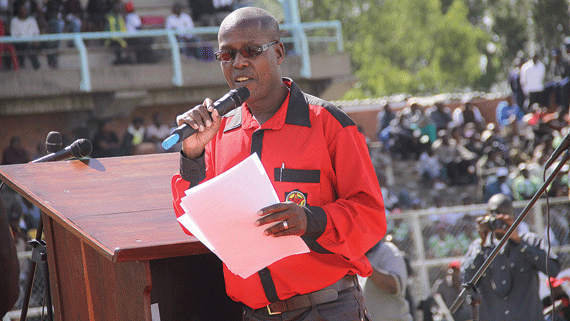
THOUSANDS of workers in Bulawayo face a gloomy festive season this year as the majority of companies are in doldrums and have been failing to pay their employees, with some going for over eight months without paying.
OWN CORRESPONDENT
The few surviving companies are in the deep-end, battling with the prevalent financial squeeze, antiquated machinery, erratic power supplies and stiff competition from imported foreign products flooding the market which collectively have resulted in depressed industry performance.
Companies like Rubber Products Manufacturing (Pvt) Ltd, Road Motor Services, Marvo (Pvt) Ltd, Pigot Masque (Pvt) Ltd and the National Railways of Zimbabwe, among many others, are at loggerheads with employees over unpaid salaries and the standoff is most likely to continue as the liquidity crunch continues to worsen.
Rubber Products Manufacturing (Pvt) Ltd last week sent its workforce on forced leave with management saying the company was technically insolvent.
Workers have not been paid for the past eight months and will be going into the festive season with empty pockets.
The company is said to be facing closure after Zesa disconnected electric power over an undisclosed debt. According to the workers, the company was set to close for the festive season on December 13 and open on January 20 next year, but with the disconnection of electricity, employees were sceptical about the reopening of the firm.
“We are no longer sure if the company will open again after electricity was disconnected. We are owed salaries for over eight months,” one worker said.
- Chamisa under fire over US$120K donation
- Mavhunga puts DeMbare into Chibuku quarterfinals
- Pension funds bet on Cabora Bassa oilfields
- Councils defy govt fire tender directive
Keep Reading
Marvo Stationery Manufacturers (Pvt) Ltd employees are facing a worse situation after going for over 11 months without pay as the company is also reported to be technically insolvent.
The company last month sent its workforce on forced and unpaid leave citing the unavailability of raw materials within the factory.
But the firm is one of the few in Bulawayo which benefited from the Distressed Industries and Marginalised Areas Fund (Dimaf) after it received a loan of $750 000 early this year, although it continues to sing the blues. The company has had running battles with workers over the years with a number of court cases still pending.
The Zimbabwe Congress of Trade Unions president George Nkiwane said the continued non-payment of workers was a cause for concern likely to continue next year unless something is urgently done to combat the situation.
“The non-payment of workers’ salaries is widespread as even some companies in both the private and public sector we thought were doing well are not paying their employees,” Nkiwane said.
“We are discussing as congress to come up with a position to address the growing problem,” he added.
Nkiwane said the non-payment of workers was likely to continue next year adding that statistics from the National Retrenchment Board were showing that 350 workers are laid off every month, which was an indication of a sick economy.
Economic analyst John Robertson said the outlook for workers next year would be bleak with more companies expected to shut down as the economy continues to weaken.
He said more companies would close next year because of policy inconsistences which the government has failed to address, chiefly the indigenisation law which calls for foreign investors to cede 51% of their shareholding to locals.
“We are in deep trouble and the challenge is that the government is not addressing the cause of our problems which is policy inconsistence,” Robertson said.
“As such, the outlook next year for workers is dismal. We have to expect more company closures, more people losing their jobs as the government has failed to diagnose the real cause of the problem,” he added.
Robertson said most private companies would not be able to pay their workers bonuses due to the prevalent liquidity crunch and the general depressed performance of industry.
He attributed the poor performance of industry to the defunct agriculture sector.
“Most industries in Zimbabwe are agro-based and if the agriculture sector is underperforming, the revival of industry would not be possible,” Robertson added.
Industry in Bulawayo is in financial distress and companies continue to close shop with last year alone recording close to 100 shutdowns.
Bulawayo industry needs an estimated $400 million to recapitalise.
However, the government has been battling to fund industry with the disbursement of Dimaf moving at a snail’s pace. Treasury has only released $13 million of the fund from the initial allocation of $40 million.
The country is going through turbulent times despite promises by the Zanu PF government to stabilise the economy and create two million jobs.
Twitter feedback @mudarikirig










